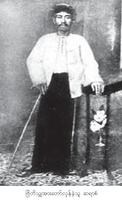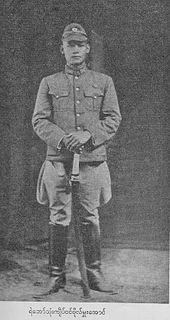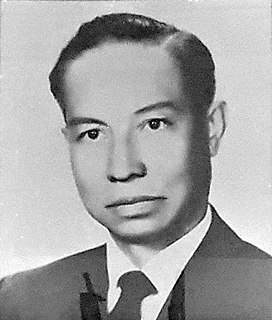Related Research Articles

Ne Win was a Burmese politician and military commander who served as Prime Minister of Burma from 1958 to 1960 and 1962 to 1974, and also President of Burma from 1962 to 1981. Ne Win was Burma's military dictator during the Socialist Burma period of 1962 to 1988.
The history of Myanmar covers the period from the time of first-known human settlements 13,000 years ago to the present day. The earliest inhabitants of recorded history were a Tibeto-Burman-speaking people who established the Pyu city-states ranged as far south as Pyay and adopted Theravada Buddhism.

Bogyoke Aung San was a Burmese politician, independence activist and revolutionary. Aung San is the founder of the Myanmar Armed Forces, and is considered the Father of the Nation of modern-day Myanmar. He was instrumental in Burma's independence from British rule, but was assassinated just six months before his goal was realized.

The Burma Independence Army (BIA) was a collaborationist and revolutionary army that fought for the end of British rule in Burma by assisting the Japanese in their conquest of the country in 1942 during World War II. It was the first post-colonial army in Burmese history. The BIA was formed from group known as the Thirty Comrades under the auspices of the Imperial Japanese Army after training the Burmese nationalists in 1941. The BIA's attempts at establishing a government during the invasion led to it being dissolved by the Japanese and the smaller Burma Defence Army (BDA) formed in its place. As Japan guided Burma towards nominal independence, the BDA was expanded into the Burma National Army (BNA) of the State of Burma, a puppet state under Ba Maw, in 1943.

Saya San also spelled Hsaya was a physician, former monk and the leader of the Saya San Rebellion of 1930-1932 in British Burma. The series of uprisings that have been called the Saya San Rebellion has been regarded as one of Southeast Asia's quintessential anti-colonial movements. Because of its national and historical nature, discussions about Saya San and the rebellion associated with him has persisted to this day, particularly within academic spheres.

The University of Yangon, located in Kamayut, Yangon, is the oldest university in Myanmar's modern education system and the best known university in Myanmar. The university offers mainly undergraduate and postgraduate degrees programs in liberal arts, sciences and law. Full-time bachelor's degrees were not offered at the university's main campus after the student protests of 1996. The bachelor's degree was re-offered from 2014 on, to the best students in the country. Today degrees in Political Science are offered to undergraduate students, as well as postgraduate diplomas in areas such as social work and geology.

The Anglo-Burmese people, also known as the Anglo-Burmans, are a community of Eurasians of Burmese and European descent, who emerged as a distinct community through mixed relationships between the British and other Europeans and Burmese people from 1826 until 1948 when Myanmar gained its independence from the British Empire. Those who could not adjust to the new way of life after independence and the ushering in of military dictatorship are dispersed throughout the world. How many stayed in Myanmar is not accurately known.

Kyaw Zaw was one of the founders of the Tatmadaw and a member of the legendary "Thirty Comrades" who trained in Japan in the struggle for independence from Britain. He was also one of the leaders of the Communist Party of Burma, and had lived in exile in Yunnan Province, China, since 1989 after retiring from politics.

British rule in Burma lasted from 1824 to 1948, from the successive three Anglo-Burmese wars through the creation of Burma as a Province of British India to the establishment of an independently administered colony, and finally independence. The region under British control was known as British Burma. Various portions of Burmese territories, including Arakan or Tenasserim were annexed by the British after their victory in the First Anglo-Burmese War; Lower Burma was annexed in 1852 after the Second Anglo-Burmese War. The annexed territories were designated the minor province of British India in 1862.

Bo Hmu Aung was a Burmese military officer and a member of the legendary Thirty Comrades who trained in Japan in the struggle for independence from Britain and regarded as one of the founders of the Tatmadaw. He also served as Speaker of the Chamber of Deputies, was the lower house of the bicameral Union Parliament of independence Burma.
The All Burma Federation of Student Unions (ABFSU) is an umbrella organisation for student unions in Burma and an active voice for academic freedoms and student rights throughout the country. ABFSU offers a reliable source of information to the outside world, reporting regularly on the attempts of the military government (SPDC) to intimidate and silence those involved in the pro-democracy movement.
The Asian Socialist Conference (ASC) was an organisation of socialist political parties in Asia that existed between 1953 and 1965. Until 1963 its headquarters was in Rangoon, Burma; the first chairman and treasurer of the conference were the Burmese socialist leaders Ba Swe and Kyaw Nyein respectively. As of 1956, the member parties of ASC had a combined membership of about 500,000. In total, four Asian Socialist Conferences convened: Rangoon, 1953 and 1954, and Bombay, 1956 and 1965.
Colonel Kyi Maung was a Burmese Army officer and politician. Originally a member of the military-backed Union Revolutionary Council that seized power in 1962, Kyi Maung resigned from the ruling council in 1963 after a public disagreement with General Ne Win, the leader of the council, on the military's long-term role in government. He joined the National League for Democracy, led by Aung San Suu Kyi, in 1988 and won a seat in the Hluttaw from Bahan Township in the 1990 general election. He was vice-chairman of the NLD from 1988 to 1997. He was imprisoned four times for a total of 12 years by successive military governments.

The 1962 Rangoon University protests were a series of marches, demonstrations, and protests against stricter campus regulations, the end of the system of university self-administration, and the policy of the new military regime of General Ne Win. The main events took place in Rangoon, Burma (Myanmar) on 7–8 July 1962. On 7 July 1962, the military regime violently suppressed a student demonstration at Rangoon University attended by some 5,000 students. This resulted in the deaths of more than one hundred, and the arrest of more than 6,000 students according to unofficial sources. However, official government statements put the death toll at 15. In the morning hours of the next day, the military regime blew up the historic Rangoon University Students' Union (RUSU) building, which had been the symbol of the anti-colonial nationalism struggle since the 1920s.
Kyandaw Cemetery, located in Kamayut Township, was Yangon's largest cemetery before it was demolished between 1996 and 1997 for redevelopment as the Yangon Drugs Elimination Museum. The relocation of graves was ordered by the Burmese government in December 1996. Descendants of the interred were given one month's notice to move the remains for reburial in Yangon's outskirts, at Yayway Cemetery and at Hteinbin Cemetery in Hlaingthaya Township. Kyandaw Cemetery occupied a 50 acres (20 ha) expanse of land about .5 miles (0.80 km) away from Yangon University. It was established during the colonial era. Kyandaw Cemetery was the city's common burial ground for Burmese Buddhists, but also included Christian, Chinese, Hindu and Islamic cemeteries. The Hindu section of the cemetery covered 1.6 hectares.

Kyaw Nyein, called honorifically U Kyaw Nyein (Burmese: ဦးကျော်ငြိမ်း;pronounced [ʔú t͡ɕɔ̀ ɲeɪɴ], was a Burmese lawyer and anti-colonial revolutionary, a leader in Burma’s struggle for independence and prominent politician in the first decade after the country gained sovereignty from Britain. He held multiple minister portfolios in the government of Prime Minister U Nu, served as General Secretary of the ruling political alliance, Anti-Fascist People's Freedom League, and was joint General Secretary of the Burma Socialist Party BSP.

The communist insurgency in Myanmar was waged primarily by the Communist Party of Burma and the Communist Party (Burma) from 1948 to 1989. The conflict ended when the CPB, severely weakened by an internal mutiny, disbanded its armed wing.
Myint Swe was a Burmese physician and writer. He is known for his first book and memoir, The Japanese Era Rangoon General Hospital, which chronicles the events at the only hospital in Yangon (Rangoon) open to non-Japanese during the Japanese occupation of Burma. It was a bestseller, and won the Burma National Literature Award, 2nd Prize for 1967. He published three more books though none achieved the first book's success.

Thiri Pyanchi Ba ThanFRCS FACS FICS was a Burmese medical surgeon, educator and administrator. The first Burmese police surgeon in British Burma, Ba Than founded and ran the main hospital in Rangoon (Yangon) as well as the wartime medical and nursing schools during the Japanese occupation of the country (1942–1945). After the country's independence in 1948, Ba Than served several terms as dean and rector of the main medical universities in Rangoon and Mandalay until two months before his death in 1971.
References
- ↑ Stahr, E. (2002). Australia's Burmese. The Author. p. 23. Retrieved 9 July 2018.
Dec. 20- commemorating the death of Bo Aung Kyaw, the first student to die Fighting the British in 1920.
- ↑ Tiwary, S.S. (2008). Encyclopaedia of Southeast Asian dynasties. Encyclopaedia of Southeast Asian Dynasties. Anmol Publications. p. 59. ISBN 9788126137244 . Retrieved 9 July 2018.
The movement became known as Htaung thoun ya byei ayeidawbon (the '1300 Revolution' named after the Burmese calendar year), and December 20, the day the first martyr Aung Kyaw fell, commemorated by students as 'Bo Aung Kyaw Day ...